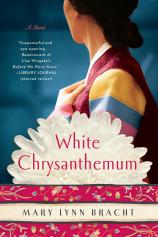White Chrysanthemum
Review
White Chrysanthemum
WHITE CHRYSANTHEMUM is a story of sisterhood, recent history, war crimes against women, and the unique strength that women are forced to develop to endure an inhumane society. Mary Lynn Bracht’s novel is masterfully crafted, deeply felt and brutally true.
It begins on Jeju Island in 1943. Hana is 16 years old and has only ever known life under Japanese occupation. Japan annexed Korea in 1910, rendering Hana and her family second-class citizens in their own country. Still, Hana is growing up strong of mind and body. She has pride in her country, she loves her family (her parents and her nine-year-old sister, Emi) and she is a haenyo --- a diver, a woman of the sea --- just like her mother.
Being a haenyo grants her independence that most women in occupied Korea aren’t afforded. She dives for pearls and fish, helping to support her family. And within the sea she finds comfort, power and weightlessness. She trains her muscles and her breath to accommodate fierce pressure and long sojourns beneath crashing waves. Along with this freedom, she takes on the responsibility to protect her younger sister.
"I deeply love this expertly written book. It is not an easy subject to explore, but it is an absolutely necessary one, and Bracht does it with incisive sensitivity and grace."
Hana knows that a crucial part of protecting Emi is keeping her away from Japanese soldiers. She doesn’t quite understand why, but she can recognize the threat. So on a summer afternoon, when she spies from the ocean a soldier about to catch sight of Emi playing on the shore, she catches his attention instead.
Hana’s sacrifice allows Emi to escape. Emi returns home, terrified, confessing to her parents that Hana was taken in her place. She must navigate an increasingly war-torn Korea without her big sister protecting her. Meanwhile, Hana is abducted, taken to Manchuria, and forced into sexual slavery for the Japanese army. She endures ceaseless humiliation and torment, her body a point of relief for soldiers at war, who use it with no respect or recognition of the human being to whom it belongs. But Hana is a haenyo, and she will do whatever she can to survive.
The novel alternates between the horrors Hana suffers following the events of that fateful summer in 1943, and Emi’s experiences in Seoul in 2011. Though Emi survived, her fate is complicated and tied up in the war. Now, her children are grown and happy, finding paths into love and peace. Emi has never let go of the survivor’s guilt and shame she’s lived with for over 60 years, and the reality of her children weighs on her --- that they’re allowed to live full lives because of Hana’s sacrifice. She is determined to find some sort of catharsis or recognition for Hana and her fellow “comfort women.”
This is a story of trauma. This is a story of survival. This is a story of guilt, and wounds that are never allowed to heal. This isn’t a clean story with a tidy ending. Bracht explores how hundreds of thousands of women have been forced into the atrocities of wartime rape, how war has historically and currently meant that women are systemically assaulted and dehumanized almost as an aside. By focusing on individual experiences, Bracht has produced a genuine and heartwrenching narrative, while also emphasizing the global shame and atrocity that we as a species allow and even expect to persist. While so many war stories center on the white male narrative, it’s refreshing and restorative to explore the largely untold experiences of Korean women during this time.
WHITE CHRYSANTHEMUM has been called redemptive, and though I don’t speak from specific personal experience, that’s exactly what resonated through my head and my heart. This novel is unfortunately timeless --- but also, in an era in which we are finally beginning to listen to survivors and victims of sexual trauma, it couldn’t be timelier. Bracht gives voice to women who have been forced into silence. She tells this story with honesty, clarity and understanding.
Bracht also does not let tragedy pervade. Though the material is deeply upsetting and predicated upon women’s lack of agency, she does grant agency to her protagonists. Though there really can’t be anything like justice for these women, Bracht uses her fiction to find a way to give them a form of it, and I am grateful that she chose to uplift in such important ways.
I deeply love this expertly written book. It is not an easy subject to explore, but it is an absolutely necessary one, and Bracht does it with incisive sensitivity and grace.
Reviewed by Maya Gittelman on February 2, 2018
White Chrysanthemum
- Publication Date: October 2, 2018
- Genres: Fiction, Historical Fiction
- Paperback: 320 pages
- Publisher: G.P. Putnam's Sons
- ISBN-10: 0735214441
- ISBN-13: 9780735214446




